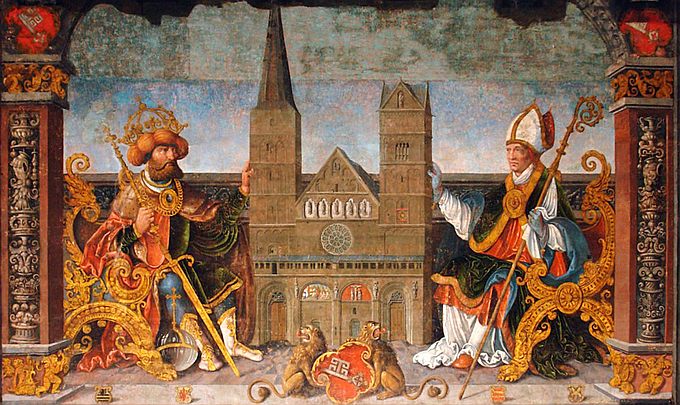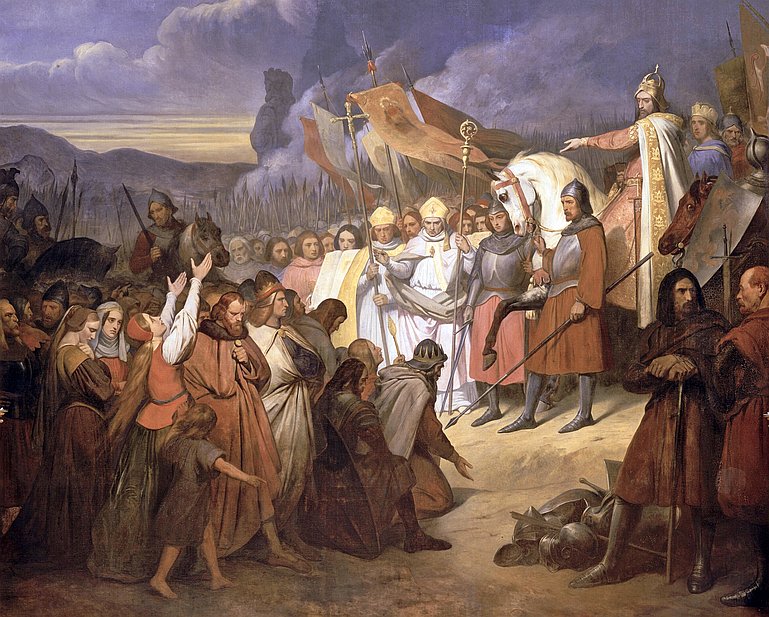
St. Willehad (right) with St. Karl the Great and the Cathedral of Bremen.

St. Willehad (right) with St. Karl the Great and the Cathedral of Bremen.
St. Willehad was an Englishman, a native of the Kingdom of Northumberland, and was educated from his infancy in learning and piety. The austerity of his life, his humility, the readiness of his obedience, and his constant prayer engaged his bishop to ordain him to the priesthood. The great spiritual conquests which many of his countrymen had made to Christ, with St. Willibrord in Friesland and St. Boniface in Germany, seemed a reproach to him, and he desired to carry the saving knowledge of the true God to some of those barbarous nations which still remained in the darkness of idolatry and the shadow of death.
King Alchred favored his resolution, and the bishops and other pious persons unanimously approved of his zeal; whereupon he was allowed to follow the divine call. He landed in Friesland, and being desirous to preach in the first place to those nations which had the least acquaintance with our Holy Faith, began his mission about the year 772 at Dokkum, near the place where St. Boniface and his companions had received the crown of martyrdom in 754. The blood of the Martyrs contributed powerfully to soften the hearts and open the eyes of the barbarians, and disposed them to receive the Faith. St. Willehad prayed with many tears upon the spot which had been watered with the blood of the holy victims for the Faith, earnestly desiring to attain to the like happiness, and begging God the salvation of those who continued obstinate in their infidelity. His prayers in their favor were heard. The infidels willingly listened to his instructions, and he baptized an incredible multitude.
His stay at Dokkum was not very long; and crossing the river Ijssel, he made his way through the country, now called Overijssel, and several other parts. The inhabitants of the village called Hugmarke, who were idolaters, cast lots whether he and his companions should be put to death. But Divine Providence determined the lots for the preservation of the holy missionaries. Having escaped out of their hands, our Saint preached in the province now called Drenthe, and many were initiated by him in the holy mysteries of the Faith. But when some of his disciples proceeded to demolish the places dedicated to the practice of superstition and idolatry, the pagans were so incensed that they resolved to massacre the Saint and his colleagues. One of them directed his sword to his neck with such force, that it would have cut off his head if Providence had not diverted the stroke. St. Anscharius assures us that the sword was entirely broken by cutting a string about Saint Willehad's neck, upon which hung a case of relics, which he always carried with him. This deliverance surprised the idolaters, and struck them with a profound veneration for the servant of God.
The Saint thence proceeded into the country where Bremen now stands, and was the first missionary to pass the river Elbe (which flows through what is now Hamburg). The Saxons at that time had spread themselves from the river Oder (which still forms much of the border between Germany and Poland) on the east, to the Rhine on the west, and to the North and Baltic Seas on the north – occupying the greater part of the northern provinces of Germany. Though divided into several cantons or tribes, which were distinct governments, they all followed the same rites and customs, and, in case of a general war, united under one commander. St. Willehad preached in this country seven years, till the great rebellion of the Saxons against St. Karl the Great (Charlemagne) broke out in 782. They had earlier made inroads upon his territories, but had been compelled to pay him a tribute in 772. During this war he destroyed their famous idol, Irmensul, with its rich temple.
In 774 Charlemagne was occupied against the Lombards in Italy; which occasion the Saxons took to revolt. But being defeated by him, they obtained their pardon in 776. Again they revolted, were defeated, and renewed their homage in 777 – with the exception of Duke Wittekind (or Widukind), a Westphalian Saxon, who had been at the head of the rebellion, and who then fled into Denmark. In 780 the Saxons took up arms again, and were again subdued. But in 782, at the instigation of Wittekind, they entered into a general conspiracy, and renewed hostilities with unparalleled rage and cruelty, raising a dreadful persecution against all the teachers of the Christian religion, and putting to death all the missionaries that fell into their hands.
St. Willehad, who had governed this whole mission seven years, escaped by sea into Friesland, and, whilst the tumult of the war rendered his missionary duties impossible, took an opportunity of going to Rome, and laying before Pope Hadrian the state of his mission. He was honorably received by the Pope, and, with his apostolic blessing, made haste to the Kingdom of the Franks (under Charlemagne), where he waited the end of the war. He spent almost two years in the Abbey of Echternach, in watching, fasting, study, assiduous contemplation, and frequent prayer at the tomb of St. Willibrord. He also made copies of the Epistles of St. Paul and other books. Here he assembled his fellow-laborers, whom the war had dispersed.

St. Karl the Great recognizes Duke Wittekind in a crowd of beggars, after the Duke had witnessed a miracle during Holy Mass.
Finally the Saint's prayers were answered. Following a miraculous vision of the Christ-Child in the Sacred Host, Duke Wittekind (image above) was converted and baptized, and peace was restored in Saxony. In 785, St. Willehad returned to his province. Charlemagne, whose protection he implored, allowed him a dwelling in the country between the Weser and the Elbe; and, two years later, after the Saint had founded many churches, the holy King procured that he be consecrated Bishop of the Saxons, on the 13th of July, 787. St. Willehad fixed his See at Bremen, which city seems only to have been founded at that time, and was afterward much enriched by its archbishops.
St. Willehad having received the episcopal character, redoubled his zeal and his solicitude in preaching, baptizing,
administering the Sacrament of Penance, and ordaining priests. His food was only bread with honey, herbs, or apples; except that
when his health was much impaired, and he was afflicted with frequent distempers, Pope Hadrian commanded him to allow himself a
little fish. He never touched wine or any other liquor, except for Mass wine. Unless some very extraordinary impediment fell out,
he never missed offering Mass every day, and usually with many tears. Holy reading and meditation were his favorite exercises;
and he usually recited the entire Psalter every day, and sometimes two or three times, with wonderful alacrity and devotion.
His cathedral church he built of wood, which his successor St. Willerich rebuilt of stone. The Saint consecrated it on November 1, 789,
in honor of Our Lord Jesus Christ under the invocation of St. Peter the Apostle. In his old age and in a very weak state of health,
he could never be induced to intermit his functions, and scarcely to mitigate any of his austerities. If Vespasian used to say that
an emperor, considering his great obligations and duties, ought to die standing, how much more justly ought a bishop to die in the
field of battle with arms in his hands? When St. Willehad lay dying, one of his disciples said to him weeping, Forsake not so soon
your tender flock, exposed to the fury of wolves.
The holy prelate answered, Withhold me not from going to God. These sheep
of mine I recommend to Him Who entrusted them to me, and Whose mercy is able to protect them.
St. Willehad died very shortly after he had consecrated his cathedral, in a village of his diocese now called Blexen –
across the Weser from Bremerhaven. His body was with great pomp conveyed to Bremen, and buried in his cathedral. He had labored
in his missions thirty-five years, and been bishop a little more than two years. On account of the many miracles wrought at his tomb,
St. Anscharius, his third successor at Bremen and the first Archbishop of Hamburg, by the authority of the Apostolic See, enrolled him
amongst the Saints, and made a solemn translation of his relics, which were unfortunately lost during the Reformation.
His feast was first celebrated on July 13, the day of his Consecration, but was later neglected and forgotten; by permission,
however, of the Sacred Congregation of Rites, it was reintroduced in 1901 in the Dioceses of Münster, Osnabrück, and Paderborn,
to be observed on a vacant day after November 8 – on which day he is commemorated in the Roman Martyrology.
Alphabetical Index; Calendar List of Saints
Contact us: smr@salvemariaregina.info
Visit also: www.marienfried.com